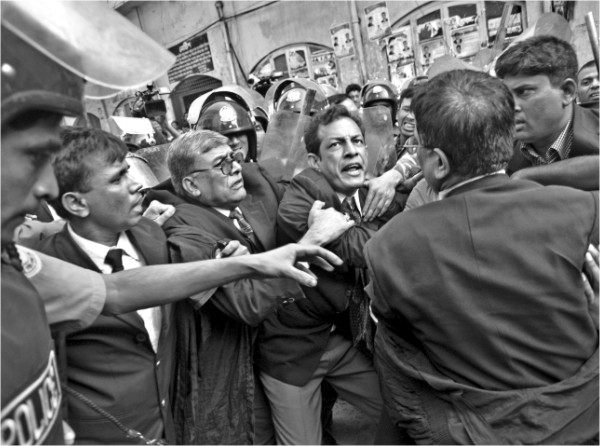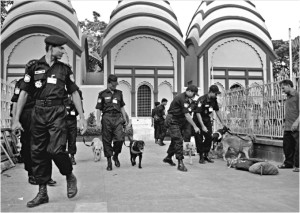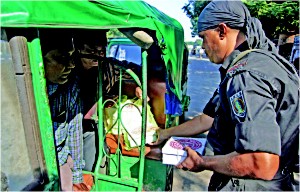

Photo: Wahid Adnan/Driknews
Improving law and order
Salma A. Shafi
Uncontrolled urbanization and increase of crime
Bangladesh is rapidly getting urbanized and in the span of four decades since Liberation in 1971 the urban population has increased from 5 millions to 40 millions approximately in 2010 . Dhaka the capital city has experienced an increase of almost ten times in the same time period. Our cities have not been planned to accommodate all these people and communities are not well organized to think and act as conscious citizens. At the same time cities are now the abode of millions of poor migrants employed mostly in the informal sector and without adequate shelter or services. Lack of stability in law and order situation has increased the overall crime and violence in the cities. The continuous rise in all types of crime and social unrest has degraded the quality of life in Bangladesh. This article explores the reasons for increasing lawlessness in our urban areas and seeks solutions for improvement.
Analysis of reasons for lawless conditions
The result of lack of law and order is escalation of crime and violence in any given situation. So stating ways to reduce crime and violence or reasons which cause them is responding to the need to improve law and order. The reasons for deteriorated conditions of law and order can be grouped into four major areas - a) political b) economic c) social reasons and d) lack of enforcement.
Effects of lawlessness and need for remedy: Causes and effects
Majority of people blame the police force for lack of trained manpower and sincerity. However, the police mentioned major cause of crime and violence in the city as an economic need driven factor where 75% of crimes are committed due to reasons of poverty and unemployment, 15% due to criminals trying to make easy money and 10% as results of unstable mental conditions of some persons i.e., drug addicts, misguided youths, romantic affairs etc. Others causes for breaking of law and order consist of a variety of reasons which are due pressures of urbanization i.e., high cost of living, unequal distribution of wealth (inequality of income). Increasing migration due to location of major establishments in Dhaka city, global trends in increase of criminal and violent offences and networking all contribute to increase of lawlessness. The combined effects of all this negative conditions impact other sectors of life in the cities.
 |
Photo: Munir uz Zaman/Driknews |
Productivity and economic growth
Daily news coverage on disturbance caused in economic activities of the city people gives an idea of the lack of law and order. Extortion, threats, hijacking, armed robbery cause suffering to every sector of commerce and industry. Individuals such as a petty trader is affected as is a major business house in the city.
The Informal Sector
Theft and extortion are the main hindrance in the informal business and trades caused both by criminal gangs and by the police. For example every month millions of taka is collected as tolls from footpath hawkers and traders of Dhaka city. A major portion of this money collected goes into the pockets of the law enforcers .
Commerce and Industries
Small, medium and large-scale industries and business enterprises in the city suffer regularly from political violence. Strikes and hartals stop production sometimes for days together. Organized criminal gangs often break into premises of banks, markets even industries and rob cash money, valuable goods and jewels, etc. Stealing of machinery and equipments from offices are common occurrences. All sectors of these industry and business have to rely heavily on private security forces sometimes with arms. Security personnel are sometimes found to be involved in these crimes rather most crimes in such cases happen through involvement of inside members.
Construction business
From the tendering stage of procurement in big projects, threats, bribery takes lead and extortion, thefts etc. continue. Private sector development work in any area is hindered by extortion through organized gangs operating locally and centrally.
Transport sectors
The city bus terminals are subject to regular extortion by various gangs under the banner of political groups or various associations. The extent of toll collection is such that every bus entering the terminal has to pay a fixed amount of Tk. 25 per trip where actually each vehicle is supposed to pay Tk. 30 per day only. Mini buses, auto rickshaws even rickshaw pullers regularly pay tolls to mastans and the police. The brunt is ultimately taken out of the passengers who have to bear the cost through increased fares.
Education and health
Violence in education institutions are common knowledge and often forces people, even the middle class to send their children to private education institutions specially at the university level. Many times in an academic year education institutions are forcibly closed due to violence mostly for political reasons . If this situation continues, the public education system in the country is bound to fail at some point and may end up in a big loss to the national resources as employment and services provided in these sectors are substantial.
 |
Photo: Munir uz Zaman/Driknews |
Women & children
Religion and social culture of the Bangladeshi society do not allow women to grow up as physically strong persons, as well as independent beings. Even in the middle and high-income groups women remain weak due to their physical and mental upbringing. Like women, children are vulnerable to crime and violence of varied nature. The lower the social status of the parents the higher the risk of oppression on any child. A girl child is more at risk and women always are susceptible to external attacks from those who are physically stronger. The vulnerability of this is proved from crime and violent occurrences to women at large as reported by the media. Particular mention must be made about the insecurity for women to travel freely in the city, even for shopping and taking children to school or to parks and playgrounds.
Addressing social disorder with a view to improving law and order
In order to improve the law and order situation it is important to analyse the situations and background of a number of aspects such as a) study background conditions for improvement needs b) detection/analysis of steps taken for prevention c) analysis of reasons d) analysis of success/failures. These are also to be aligned with the extent of involvement of existing systems i.e., police enforcement, civil society, NGOs, private sector, government policy and governance structures and political parties.
To conduct the analysis for reporting on existing conditions and systems for enforcement a SWOT analysis (Strength, Weakness, Opportunities, Threats) for each investigation area may be done in any given situation. SWOT analysis of the crime and violence prevention/enforcement system can include Legal and judiciary systems, Police System, Other forces (Defense, Parastatal, private security) and Media and communication.
Gender issues
Focusing on need for strategy to support women in crime and violence prevention needs no introduction. Some key questions in all situations can strike the right resonance for taking adequate measures. To start with , Are all stakeholders clear in their understanding of needs to address women issues with regard to crime and violence? Have all stakeholders in their groups included women members? How can women be encouraged to participate in an equal number or close to 50 %in the process? What are the capacity, interest and willingness of organizations to include women? Are women's organizations or groups included? Do they represent women of all backgrounds?
Particular mention is always due to include domestic and garment workers representatives or organizations in stakeholder team and identify barriers to women's participation.
Interventions for Improvement of law and order
As a natural outcome of the need to reduce crime and violence, some goals and target are interventions proposed to a) reduce rate of crime and violence in the city and community areas b) allow people to move safely in the city without fear of hijacking, extortion etc. c) ensure safety and security for movement of women and create a safe environment for all to conduct their everyday business in peace and harmony d) ensure safety and security in public open places and e) create a bonding among the city people for realization of the above goals.
Targeted activities in this line can include raise awareness of all citizens about crime and violence conditions, make citizens aware about their responsibilities with regard to law and order and create scope for the government to design and implement programs to ensure law and order. In this context, identifying stakeholders and ensuring their participation is important. A brief list of important stakeholders are government, civil society, representatives of private sectors, NGOs etc. Their responsibilities are discussed below:
 |
Photo: Mahabub Alam Khan/Driknews |
Government: Needs to demonstrate political will to improve law and order conditions in the country, Declare goals and plans to achieve them, Commit reporting on plan and progress, Include law and order related programs to PRSP and declare budget to be spent, Make city government and local authorities responsible to their constituencies to ensure safety and security in their areas.
Civil society: Prime duty is to create awareness about the need for law and order, Engage in actions to pressurize decision makers to take the subject seriously, Enlighten the government by providing good examples from other countries on dealing with the problem, Strengthen local and national linkages among institutions and coordinate with international groups, Build network and partnerships to pressurize government and make elected representatives responsible.
Private sector and other actors : The private sector can contribute by organizing and managing crime and violence protection within their sphere of projects and programs. The Government with support of donor agencies can start an awareness campaign on the topic. Reduction of crime and violence , improvement of law and order should be an important component of the Government and Donors in their Poverty Reduction Programs (PRSP) and Millennium Development Goals (MDGs) for Bangladesh.
The author is an architect and a town planner, and has her private practice.